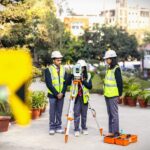Are you passionate about technology and design? Do you love surfing through interactive mobile applications, websites, and online cloud software? If yes, then web development could be a great career option for you after the 12th. The best part is that web development is also one of the in-demand careers in 2025 and beyond. With over 5.56 billion users worldwide, the demand for skilled web developers is only expected to grow, making it a perfect, lucrative career choice.
But the real question is how to become a web developer, especially if you’re just stepping out of school. To help you, here is all you need to know about becoming a web developer, right from understanding the role of a web developer to the skills you will need and the courses you can pursue after 12th:
How to Become a Web Developer: Highlights
| Industry | IT (Information Technology) |
| Eligibility Criteria | 10+2 with science stream and computers as a compulsory subject |
| Average Salary for Beginners | INR 2-4 LPA |
| Job Opportunity | All Sectors (From Pharma to Accounting) |
Must Read: Top 10 Best Computer Courses After 12th for High Salary & Jobs
What Does a Web Developer Do?
A web developer is responsible for creating and managing a website. They can work as freelancers, full-time employees, or as part of software development teams. Some key responsibilities of a web developer include:
- Creating new websites as per the client’s requirements.
- Updating and maintaining the existing website as per the new trends and requirements.
- Writing code in programming languages such as HTML, CSS, JavaScript, Python, PHP, and more.
Types of Web Developers
There are three types of web developers: front-end, backend, and full-stack developers. Here is all you need to know about each of them:
1. Front-End Developer:
A front-end developer is responsible for the look and feel of a website. They are responsible for creating part of the website that you see, such as buttons, images, colour, text formatting, and much more.
2. Back-End Developer:
A back-end developer is responsible for handling the server-side logic, databases, and infrastructure of the website. They work behind the scenes to ensure that the website works smoothly.
3. Full-Stack Developer:
A full-stack developer is an all-rounder, capable of handling both front-end and back-end development.
Must Read: Top 10 High-Paying Courses After 12th (All Streams)
Web Development Courses After 12th
If you are wondering “how to start being a web developer”, then pursuing a course that equips you with fundamental web technologies like HTML, CSS, and JavaScript is the way to go. Here are some popular web development courses one can pursue after 12th:
Undergraduate Courses
- Tech in Computer Science Engineering: A 4-year program, mostly for science stream students, that teaches students web development, programming, and more.
- BCA (Bachelor of Computer Applications): A 3-year program that covers programming languages like C, C++, and Java, database management, networking, web development, and more.
- in Computer Science: A 3-year course that built a strong foundation for programming languages, algorithms, data structures, software development, and computer systems.
Diploma Courses
- Diploma in Web Development: Usually lasting 1-2 years, a diploma course covers HTML, CSS, JavaScript, and often includes Photoshop, UI/UX basics, and frameworks. The course is perfect for those who want to start a career in web development sooner.
Certificate Courses
There is a range of certificate courses offered by different online academies that one can pursue to start their web development career. Whether you want to learn to be a front-end developer or a full-stack web developer, there is a course for you. Some of the popular certification courses include:
- Certification in HTML, CSS, and PHP
- Certification in Web Development
- Certification in Full-Stack web development
- Certification in Front-end web development
- Certification in Back-end web development
Must Read: 11 Top Career Opportunities After BCA That You Should Know
Web Developer Education Requirements
Here are a few web developer education requirements:
- For an undergraduate course, 10+2 with a science stream and computers as a compulsory subject from a recognized board.
- For a diploma-type course, institutes generally accept 10+2 merit or even class 10 results, depending on the curriculum.
- A candidate has to score a minimum of 55% aggregate marks in 10+2 to qualify for a web development course.
Must Read: 7 Best Course After 12th Arts | Career Options & Salary Guide
Scope for Web Development: Roles & Salary
The demand for web development in India is on the rise, with websites being used in various sectors, such as entertainment, social networking, online shopping, and education. A web developer has a range of opportunities in roles, such as:
- Front-end web developer
- Back-end web developer
- Full-stack web developer
- Senior web analyst
- Web application developer
- Design and layout analyst
- Web designer
- Web page design
- Web marketing analyst
As a web developer, you can work in IT companies, advertising agencies, publishing houses, marketing firms, and MNCs, among others. And if you don’t want to work under someone, you can always become a freelance web developer by building a strong portfolio of your work.
The average salary of web developers can range from INR 3 to 9 LPA, depending on location, designation, and experience. Here is the average salary offered for different web development roles:
| Job Profile | Average Annual Salary |
| Front-end | INR 5-6 LPA |
| Back-end | INR 6-7 LPA |
| Full stack | INR 7-8 LPA |
| UI/UX Designer | INR 3-9 LPA |
| Web Designer | INR 2.5-7 LPA |
As we conclude, web development can be a promising career choice for students after the 12th. With a web development course, one can learn existing skills, work on cool projects, and ultimately, land a high-paying job. However, remember that while becoming a web developer is not hard, it still requires dedication and consistent efforts.
To start your journey of becoming a web developer, consider enrolling in the B. Tech CSE and BCA programs at Graphic Era (Deemed to be University). Our courses will equip you with all the necessary skills required to build a successful web development career.








